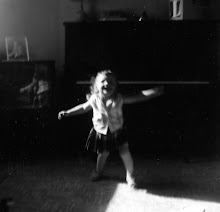I have developed neutropenia, which means my white blood-cell count is low and I'm prone to infection (the doctor says I should be more frightened by the bugs inside my own body than the ones on the people around me, but I still have a PLEASE WASH HANDS sign in my front porch). We have opted not to give me the thousand-dollar injection of Neupogen in hopes that I'll be OK without it -- I guess the numbers weren't too bad.
So far my hair is still on my head. I've developed some impressive zits on my face. The Porta-cath still hurts. No mouth sores so far. I'm sleeping much better than I was a week ago. I still have dizziness and a feeling of being car-sick -- that sensation that the air you're breathing is suddenly very cold and your head is woozy -- but that's decreased.
As for my back, the pain continues to shift and change, as it has for the past year with the slow and gradual collapse of that vertebra. I still have no pain at night. It's been amazing to me how much worse it got after the armpit surgery. If anything, my armpit feels worse than it did the first week after surgery; I still feel as though I have a large bulldog clip there. Between the tightness of the incision there, the spine pain between my breasts and the Porta-Cath on the right side of my chest, I feel like my torso is encased in concrete. But this week I seem to be able to lie on an incline again, which makes typing possible. If I have an active morning (meaning, put in a load of laundry, do some stretches, take a shower, wash my hair), by noon I'm in agony and have to take codeine. But if I skip the shower/bath and lie around a lot, I can manage without the painkillers, and can even walk for 10 minutes or so. I've been going out with the wheelchair, pushing it for a distance and then sitting in it for a while.
Interestingly, I believe my rib pain has diminished considerably. I don't know if the chemo can work that quickly, but my guess is that I do have bone metastasis, and the spinal kyphosis is just an unlucky coincidence.
Meanwhile, Dr. Second has disappointed me, as has his secretary. Since consulting with him on February 23, I have now called his office four times, once speaking to the secretary, three times leaving a message, to ask for the name of the back brace that the doctor alluded to in our interview but failed to write down for me. In my last message, four days ago, I stressed that I am in terrible pain and now require a wheelchair, but I have heard not a peep. Waiting a long time to see him is one thing -- I know he's incredibly in demand. But what would it take for him to tell the secretary the name of that brace and for her to call me back? Meanwhile, I have been in touch with a friend of a relative who had revision surgery after her spinal fusion with Harrington rods fell apart (this Wikipedia entry fairly accurately reflects my experience of that procedure, which she had in 1974 and I had in 1966 -- my spine looks a little like the X-ray below), and it turns out that her surgeon was the one I was thinking of getting a third opinion from, whom I'll call Dr. Third. In fact, as it turns out, I learned about Dr. Third because this woman posted about him on a Yahoo group devoted to post-scoliosis-surgery problems. She liked him a lot and was happy with her surgery. I think I'll try for a referral after all.









No comments:
Post a Comment